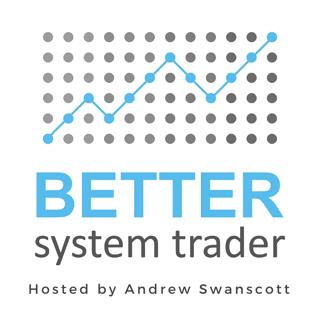
027: Trader and Psychologist Dr Gary Dayton discusses why traditional approaches to controlling emotions don't work, the role of emotions in trading and how mindfulness can improve trading performance.
Dr. Gary Dayton has been an active trader since 1999 and is President of a consulting firm that specializes in developing "peak" performance in traders. His approach to trading psychology is very different to the traditional approaches used by other trading coaches, introducing traders to the practise of mindfulness to not only overcome fear and other unwanted trading emotions but to develop the concentration and focus needed to trade successfully. In this episode we discuss why traditional approaches to controlling emotions don't work, the role of emotions in trading and how mindfulness can improve trading performance. He also shares some tips on how to get started practising mindfulness, the benefits it can have outside of trading and how the approach of Mental Parking can increase focus. Topics discussed Comparisons of sports and trading performance Traditional approaches to handling emotions in trading and why they don't work Why it's impossible to suppress your emotions Landing a plane in the Hudson River and what the Captains response teaches us about trading The role of emotions and how experienced traders actually leverage emotions in trading The concept of Mindfulness and the benefits to traders How to use Mindfulness when trading The evidence that Mindfulness can improve trading performance and how it impacts the brain How to get started practising Mindfulness How to use Mental Parking to increase focus and productivity How exercise can improve mental and trading performance Disclaimer: Trading in the financial markets involves a substantial risk of loss and is not suitable for everyone. All content produced by Better System Trader is for informational or educational purposes only and does not constitute trading or investment advice. Past performance is not necessarily indicative of future results.
3 Okt 20151h 1min

026: Systematic trader Robert Carver discusses trading rules, what makes a good trading rule and the advantages of using continuous rather than binary rules. He also shares insights into over-fitting and the challenges of walk-forward testing that can mak
Robert Carver is an independent systematic trader who spent more than seven years working for one of the worlds largest systematic hedge funds. In this episode we discuss trading rules, what makes a good trading rule and the advantages of using continuous rather than binary rules. He also shares insights into over-fitting and the challenges of walk-forward testing that can make it impractical. Topics discussed What makes a good trading rule The advantages of simple rules Why only some trading rules are profitable Walk-forward testing and some of the challenges that can make it impractical How much data you actually need to determine if a trading rule is better than another Why choosing the optimal values during a walk-forward test is not the best approach and some alternatives Weighting trading rules Steps to avoid over-fitting Should trading rules be adjusted for individual instruments? Continuous trading rules compared to binary rules The applications and advantages of continuous trading rules What makes a good systematic trader The issues that overconfidence creates in trading Two aspects of institutional trading that most retail traders could apply to their own trading Disclaimer: Trading in the financial markets involves a substantial risk of loss and is not suitable for everyone. All content produced by Better System Trader is for informational or educational purposes only and does not constitute trading or investment advice. Past performance is not necessarily indicative of future results.
27 Sep 201557min

025: Dr Brett Steenbarger, trader and trading coach, discusses creativity, static thinking and why it's important to have unique ideas for trading success. We also cover tips to increasing our creativity, why traditional trading rules need to be updated,
Brett N. Steenbarger, Ph.D. is a trader, psychologist and trading coach who has been actively involved in the financial markets since the late 1970s. He is the author of a number of popular trading performance books and consults for hedge funds, investment banks and proprietary trading groups. Brett has an interest in using historical patterns in markets to find a trading edge publishing measures and strategies on his popular TraderFeed blog. He is also a regular contributor to Forbes. In this episode we discuss creativity, static thinking and why it's important to have unique ideas for trading success. We also cover tips to increasing our creativity, why traditional trading rules need to be updated, the challenges of daytrading and how to overcome them. Topics discussed Three important components of successful traders Why the traditional rules of trading need to be updated Why traders get stuck in static thinking and need to be more like entreprenuers The two different types of trading brains and how understand which we are can improve our results How creativity can be used in the strategy research process Why we come up with ideas at seemingly random times and how that can be harnessed to improve our trading The two stages of creativity and how traders are hurting their performance by neglecting the second stage How just immersing ourselves in the market without stepping back can be harming our performance Improving creativity through lifestyle Why unstructured free time away from the markets can improve your trading Techniques to turn creativity into a habit How Brett identified his strengths and used those to dictate his trading style The challenges of daytrading and how to approach them Analysing successful trades to improve performance Why we need to have something more important in your life than trading PLUS listener questions on: Applications of diffusion indices Formalising edges and the impact of market regimes on edge performance How traders can follow their rules about stops and targets The psychological differences between systematic and discretionary trading The validity of Acceptance Commitment Therapy (ACT) in trading Handling drawdowns and turning it into a constructive experience How to move from retail trader to full-time/pro Disclaimer: Trading in the financial markets involves a substantial risk of loss and is not suitable for everyone. All content produced by Better System Trader is for informational or educational purposes only and does not constitute trading or investment advice. Past performance is not necessarily indicative of future results.
21 Sep 20151h

024: Trader coach Dr Van Tharp discusses beliefs and their impact on trading, the qualities of successful traders, adapting trading to market types, position sizing, trading mistakes and overcoming fear, perfectionism and impatience.
In this episode Dr Van Tharp talks about beliefs and their impact on trading, the qualities of successful traders, adapting trading to market types, position sizing, trading mistakes and overcoming fear, perfectionism and impatience. Topics discussed How Van got started in the markets and the issues he faced initially The main reasons the majority of trades are unsuccessful How traders can identify the type of strategies that suits them What it means to trade your beliefs in the market How to assess whether your beliefs are useful or limiting The real importance of psychology in trading Your collection of parts and how they interact The process of transformation in a trader Qualities of losing traders and how to test yourself for them The impact mistakes could be having on your results without even knowing How to cope with larger trade sizes as your account grows PLUS listener questions on: Using position sizing to meet your objectives The 6 market types, how to measure them and how to apply it to your trading How to find positive expectancy systems Developing patience when in a trade Trading in short timeframes How to address issues with perfectionism Systematic vs Discretionary trading Overcoming fear of pulling the trigger Handling drawdowns Disclaimer: Trading in the financial markets involves a substantial risk of loss and is not suitable for everyone. All content produced by Better System Trader is for informational or educational purposes only and does not constitute trading or investment advice. Past performance is not necessarily indicative of future results.
13 Sep 201552min

023: Portfolio manager Michael Himmel discusses Artificial Intelligence, the challenges and applications of AI in trading, criticisms of Machine Learning, event studies and the importance of selecting datasets.
Michael Himmel is a Founding Partner, Portfolio Manager and Director of AI Research for Essex Asset Management. He has been actively trading and designing systems since the 1980s, managing the No.1 Global Macro Hedge fund in the world in 1999. He now uses large doses of AI and Machine Learning in his current practice. In this week's episode we discuss Artificial Intelligence, the challenges and applications of AI in trading, criticisms of Machine Learning, event studies and the importance of selecting datasets. He also shares insights from starting out as a runner for some of the biggest players in the 1980s, to managing the no. 1 global macro hedge fund in 1999 to using AI in his practise today. Even if you're not into AI and machine learning, the stories and insights Michael shares are invaluable. Topics discussed Lessons from running orders for some of the big players in the 1980s Transitioning from discretionary to systematic trading The challenges of applying Artificial Intelligence (AI) and Machine Learning in the 1990s How changes in technology have made AI in trading available to almost every body How Hedge Fund Lambeth Capital achieved a 260% return in 1999 The impact September 2001 events had on hedge fund operations The applications of AI in non-finance industries The three divisions of AI The relationship between machine learning and AI Trading applications of AI How to decide which datasets should be used to avoid data mining Addressing the criticisms of machine learning The challenges of using AI for longer timeframes and is it the right tool for the job? Event studies in trading The future of trading Disclaimer: Trading in the financial markets involves a substantial risk of loss and is not suitable for everyone. All content produced by Better System Trader is for informational or educational purposes only and does not constitute trading or investment advice. Past performance is not necessarily indicative of future results.
5 Sep 201559min

022: Proprietary trader Robert Bubalovski discusses prop trading, arbitrage and pairs trading, statistical trading and what it takes to be a successful trader.
Robert Bubalovski is the Managing Director and Head Trader at TradeView investments, a privately held proprietary trading firm located in Melbourne, Australia. Since 1996 Robert has been actively involved in the financial markets and trading, in 2012 he decided to set up his own Proprietary Trading Firm to concentrate on his own trading strategies. His team of professional proprietary traders specialize in the trading of Equities, Futures, Options, FX and Money Markets across multiple exchanges around the globe and around the clock. In this weeks episode we discuss prop trading, the challenges and lessons from beginner trader to starting an investment firm and what it takes to be a successful trader. We also discuss arbitrage and pairs trading strategies, statistical rather than indicator-based trading and the importance of simplicity. Topics discussed The pros and cons of prop trading The progress of a prop trader How long it takes to become a successful prop trader The attributes of successful traders Advice for those wanted to get started in prop trading Challenges starting out and the lessons learnt Arbitrage and Pairs trading Index arbitrage Selecting stock pairs for arbitrage opportunities Getting started in pairs trading/arbitrage The benefits of pair trading indices vs stocks The dangers of pairs trading in stocks Why keeping strategies simple is so important The main attributes a trader needs to be successful How to increase trade size and be comfortable with it The advantages of strategies based on statistics rather than indicators Disclaimer: Trading in the financial markets involves a substantial risk of loss and is not suitable for everyone. All content produced by Better System Trader is for informational or educational purposes only and does not constitute trading or investment advice. Past performance is not necessarily indicative of future results.
30 Aug 201550min

021: Tim Rea discusses aspects of trading multiple strategies, including monitoring performance, money management, correlation, technology and trading in markets not in your timezone. We also discuss the impacts of the MFGlobal and PFG collapses a
Tim Rea is a proprietary trader, trading his own money with well over 100 automated systems across 25 different Futures contracts. He is a past winner of the World Cup trading championship, along with being a CTA and broker but gave that away to focus on trading his own money. In this weeks episode we discuss various aspects of trading multiple strategies, including monitoring performance, money management, correlation, technology and trading in markets not in your timezone. We also discuss the impacts of the MFGlobal and PFG collapses and how Tim overcame the heavy losses to continue trading. Topics discussed How poor experiences investing with others drove Tim to figure it out for himself Becoming a systems vendor, CTA and broker and why he then left it all behind to just trade his own money How shorter term trading can increase confidence in a system How many strategies he's currently trading (hint: its more than 100!) Keeping track of the performance of multiple strategies Why you shouldn't just stop trading a system when the drawdown is larger than it has been historically Why you should try to understand the underlying reasons for strategy drawdown Considerations when adding more strategies to a portfolio Managing correlations with multiple strategies Position sizing when trading multiple systems The benefits of trading a portfolio vs trading an individual method How to manage trading in markets not in your timezone The impact of the PFG collapse and how Tim overcame the heavy losses Lessons learnt from dealing with MFGlobal and PFG collapses How to manage your trading account to minimise risk of loss in another collapse The benefits of trading Forex How Tim won the World Cup Trading championship trading just the EURUSD The importance of vision in your trading business Disclaimer: Trading in the financial markets involves a substantial risk of loss and is not suitable for everyone. All content produced by Better System Trader is for informational or educational purposes only and does not constitute trading or investment advice. Past performance is not necessarily indicative of future results.
23 Aug 201553min

020: Larry Williams talks conditional trading, what drives prices, the misuse of indicators, cycles, forecasting markets PLUS 50 years of trading insights
In this weeks episode Larry Williams talks about conditional trading, understanding what drives prices, the misuse of indicators and how to apply them correctly. We also discuss cycles, forecasting markets, what to look for in market tops plus loads of listener questions where Larry shares tips and insights from 50 years of trading. Topics discussed What it means to be a conditional trader Why buy and sell signals need to be analysed in the context of market conditions Fundamental factors that drives markets Interpreting the COT reports correctly The buying differences between retail and commercial traders and how it can indicate future market direction Why you should approach trading like a combination lock Coming up with unique indicator ideas The mis-use of indicators and how to use them correctly Trading styles of successful traders Forecasting markets based on technical factors Characteristics of stock market tops and bottoms The fundamentals to watch during market tops Listener questions Issues with the Forex market Trading prices patterns, do they still work and are they scalable Why short term price patterns work What happened in 2002 and why you need to consider that when backtesting Will trend trading always be effective? How many positions to trade at one time Money management tips for those who aren't into heavy maths Choosing the best markets to trade Favourite Larry Williams indicator What keeps Larry motivated to trade after 50 years What drives peak performance (it's not money…) The key component that really drove Larry to becoming a consistently successful trader How Larry lasted so long in the industry How to overcome emotions when entering or holding trades Larry's biggest contribution to the trading industry Why Larrys strategies have lasted the test of time Common traits against the most successful traders The trading model that's worked for Larry for over 50 years Disclaimer: Trading in the financial markets involves a substantial risk of loss and is not suitable for everyone. All content produced by Better System Trader is for informational or educational purposes only and does not constitute trading or investment advice. Past performance is not necessarily indicative of future results.
16 Aug 20151h 7min





















